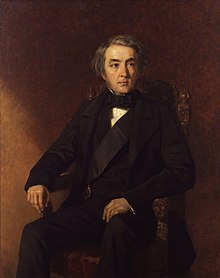
Back فرانسيس اجيرتون ARZ Francis Egerton, 1. Earl of Ellesmere German Francis Egerton (1er comte d'Ellesmere) French Francis Egerton, I conte di Ellesmere Italian Эджертон, Фрэнсис, 1-й граф Элсмир Russian Francis Egerton, 1:e earl av Ellesmere Swedish
The Earl of Ellesmere | |
|---|---|
 Portrait of the Earl of Ellesmere by Edwin Longsden Long | |
| Chief Secretary for Ireland | |
| In office 21 June 1828 – 30 July 1830 | |
| Monarchs | George IV William IV |
| Prime Minister | The Duke of Wellington |
| Preceded by | Hon. William Lamb |
| Succeeded by | Sir Henry Hardinge |
| Secretary at War | |
| In office 30 July 1830 – 15 November 1830 | |
| Monarch | William IV |
| Prime Minister | The Duke of Wellington |
| Preceded by | Sir Henry Hardinge |
| Succeeded by | Charles Williams-Wynn |
| Personal details | |
| Born | Francis Egerton 1 January 1800 Piccadilly, London |
| Died | 18 February 1857 (aged 57) Westminster, London |
| Political party | Tory |
| Spouse |
Harriet Greville (m. 1822) |
| Children | 11, including: George Egerton, 2nd Earl of Ellesmere Hon. Francis Egerton Hon. Algernon Egerton |
| Parent(s) | George Leveson-Gower, 1st Duke of Sutherland Elizabeth Gordon, 19th Countess of Sutherland |
| Education | Eton College |
| Alma mater | Christ Church, Oxford |
Francis Egerton, 1st Earl of Ellesmere, KG, PC, PC (Ire) (1 January 1800 – 18 February 1857), known as Lord Francis Leveson-Gower until 1833, was a British politician, writer, traveller and patron of the arts.[1][2] Ellesmere Island, a major island (10th in size among global islands) in Nunavut, the Canadian Arctic, was named after him.
- ^ . Dictionary of National Biography. London: Smith, Elder & Co. 1885–1900.
- ^ Chisholm, Hugh, ed. (1911). . Encyclopædia Britannica. Vol. 9 (11th ed.). Cambridge University Press. pp. 290–291.